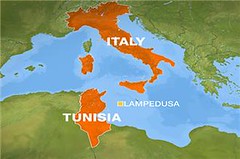
Map showing Italy and Tunisia where many people from that North African state have fled the country to southern Europe in the aftermath of the uprising on Dec. 17, 2010. Ben Ali has resigned but the RCD largely remains in power.
Originally uploaded by Pan-African News Wire File Photos
North African nation to get radars, boats and other forms of assistance from Italy to counter illegal immigration
Last Modified: 15 Feb 2011 15:36 GMT
Tunisia and Italy have agreed to work together to counter illegal immigration after thousands of migrants arrived on the tiny island of Lampedusa earlier this week.
According to Tap, Tunisia's official news agency, an agreement between Italy's foreign minister and Tunisia's interim prime minister was made late on Monday night.
Under the deal, Italy will give Tunisia practical aid including a "network of radars and fast boats that will be operated by Tunisians", the agency quoted Franco Frattini, the Italian minister, as saying.
Frontex, the European Union's border agency, also said on Tuesday it would help Italian authorities deal with the influx, providing up to 50 personnel, vessels and aircraft.
The agreement follows a diplomatic row between the two countries sparked when an Italian minister suggested sending police to Tunisia to stem the flow of refugees.
Tunisia accused Rome of infringing on its sovereignty.
Italy has asked the European Commission for $134m in aid to help deal with the influx of migrants, who have been housed in holding centres in Lampedusa, Sicily and the mainland.
The country earlier warned of a humanitarian crisis as boatloads of people arrived, most saying they could not find work in Tunisia.
'Very marginal' cases
For its part, France said on Tuesday it could take a few "very marginal" cases from the estimated 6,000 Tunisians.
"France's position is not to reward illegal immigration," Laurent Wauquiez, the country's European affairs minister, said.
"The interior ministry will examine on a case by case basis those who qualify for the right to immigration. Those cases can only be very marginal."
France was formerly the colonial ruler of Tunisia and has a large population of Tunisian origin.
Nazanine Moshiri, Al Jazeera's correspondent in Tunisia, said it was unlikely the migrants were fleeing political upheaval after a January uprising ousted the president.
She said it was more a case of many taking advantage of a security vacuum along the country's vast coastline.
Italian authorities said overnight on Monday they had intercepted another boat carrying 32 people believed to be of Egyptian origin off the coast of Sicily, signalling that refugees from other Arab states could also begin fleeing.
"The institutional earthquake that took place in Egypt could provoke significant immigration flows," Roberto Maroni, Italy's interior minister, said on Tuesday.
"Europe cannot remain indifferent: it must take a strong and decisive political decision."
But as European nations work with Tunisia to stem the flow of people, migrants on Lampedusa thanked Italy for welcoming them to the island.
Under control
Bernardino Rubeis, Lampedusa's mayor, has said that the Tunisians have mostly been respectful and that the situation is under control.
"There is no security emergency because they are free to walk around the island, but they are respecting our territory, not creating any trouble," he said.
Many of new arrivals awaited ferries on Tuesday to take them from Lampedusa to immigrant holding centres elsewhere in Sicily or on the Italian mainland.
Meanwhile, Tunisian authorities have extended a state of emergency in the country, but dropped a nationwide curfew.
"To prevent anything that may harm the security of the state and to ensure the security of citizens and protection of public and private goods, it was decided to extend the state of emergency from Tuesday February 15 until further notice," the interior ministry said on Tuesday.
Since Zine El Abidine Ben Ali's overthrow, Tunisia's interim government has been making faltering steps towards stability, but police have melted away in many places, and strikes and protests have disrupted the economy.
Source: Al Jazeera and agencies
No comments:
Post a Comment